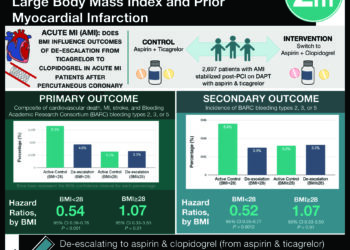Consistent parenting linked to lower child BMI
Image: PD
1. Among both mothers and fathers included in a prospective investigation, parenting consistency correlated negatively with child BMI.
Evidence Rating Level: 2 (Good)
Study Rundown: Childhood obesity affects 1 out of every 4 children in Western countries and has consequences for childrens’ future health and well-being. Childhood obesity cannot be explained by genetics alone, leading many researchers to focus on the role of modifiable environmental factors. One such environmental factor, parenting consistency which includes how parents ensure compliance with age-appropriate rules and expectations, can affect childhood lifestyle behaviors. Past research has suggested that lower paternal parenting consistency was associated with higher BMI in children, without exploring the role of child BMI on parenting. The current study sought to identify the association between both maternal and paternal parenting consistency and child body max index (BMI) and investigate the possibility of a bidirectional relationship. Researchers found that among mothers and fathers, parenting consistency was negatively correlated with child BMI, with higher levels of parenting consistency were linked to lower child BMIs at the next wave or data collection point. Results did not provide evidence suggesting a bidirectional relationship between parenting consistency and child BMI. Limitations of this study include loss to follow-up and missing data, particularly in children from disadvantaged families who are at an increased risk for obesity. Furthermore, age trends in parenting-BMI relationships were not evaluated; associations may change in adolescence. These findings support a protective influence of parenting consistency on child BMI implying that childhood obesity interventions should address parenting styles and encourage both maternal and paternal involvement.
Click to read the study published today in Pediatrics
Relevant Reading: Preschooler Obesity and Parenting Styles of Mothers and Fathers: Australian National Population Study
Study Author, Dr. Pauline Jansen, PhD, talks to 2 Minute Medicine: Erasmus Medical Center, Child and Adolescent Psychiatry/Psychology, Rotterdam, The Netherlands; Murdoch Childrens Research Institute, Victoria, Australia.
“Research on child development provided evidence that parents influence child behaviour, while parents also respond and adapt their parenting strategies to children’s behaviour and needs. Despite great interest in parental influences on children’s lifestyle behaviours and overweight, research hardly considered possible reverse directionality in this relation. Knowledge on cause and effect in this relationship will inform pediatric overweight prevention and treatment, as it will enhance understanding of which behaviours can be targeted best.
We used a unique approach to examine possible bi-directionality in the relation between global parenting consistency and child body mass index (BMI), and found that consistency benefits child BMI, while child BMI did not influence parents’ consistency. Thus, improved child BMI could be among the benefits of promoting parenting consistency. In general, our study supports recent calls for expanding childhood overweight interventions to address the broad parenting context, while involving both mothers and fathers.”
In-Depth [prospective cohort study]: A total of 4002 child-parent triads were studied, with data from the nationally representative Growing up in Australia: Longitudinal Study of Australian Children. Data were collected every 2 years for a total of 4 time points; children were aged 4 to 5 years when recruited in 2004 for Wave 1 and 10 to 11 years at the Wave 4. At Wave 1, 42% of mothers and 66.8% of fathers were overweight. Correlations between maternal and paternal parenting consistency within each wave were modest (r = 0.22-0.36). Maternal and parental parenting consistency were both significantly negatively correlated with child BMI, within and between waves, indicating that higher levels of parenting consistency were associated with lower child BMI (all correlations were negative, with the strongest relationships being r = -0.082 for fathers at Wave 3 and r = -0.066 for mothers at Wave 4; p < .001). Furthermore, although higher levels of parenting consistency predicted lower child BMI in the next wave, the associations were small (each 1.0 SD increase in maternal parenting consistency at Wave 1 was associated with a 0.025 reduction in child BMI at Wave 2). There was no support for bidirectional influences and no differences were found in parenting consistency influence on child BMI between boys and girls or between parents who were normal weight and overweight.
By Cordelia Y. Ross and Leah H. Carr
More from this author: Cough medicine-related ED visits linked to unsupervised ingestion; Shared decision-making associated with increased parental resistance to vaccinations; AAP policy statement addresses influence of media on children; Pediatric gunshot injuries associated with higher mortality and costs; Psychotropic medication use declining in children with behavioral disorders
©2012-2013 2minutemedicine.com. All rights reserved. No works may be reproduced without expressed written consent from 2minutemedicine.com. Disclaimer: We present factual information directly from peer reviewed medical journals. No post should be construed as medical advice and is not intended as such by the authors, editors, staff or by 2minutemedicine.com. PLEASE SEE A HEALTHCARE PROVIDER IN YOUR AREA IF YOU SEEK MEDICAL ADVICE OF ANY SORT.







